Pew Research Center interviewed in all regions of Ukraine except Luhans’k, Donets’k and Crimea, due to the security situation on the ground.1 The survey represents roughly 80% of the Ukrainian population. While Luhans’k and Donets’k are populous oblasts within the eastern region, the survey still covers a substantial proportion of the east and was designed to allow for analysis of the regional divide in attitudes.
Overall, Ukrainians living outside the Donbas region and Crimea continue to be very dissatisfied with their country’s economy. They are also increasingly critical of their national government and see little progress in the confrontation in the east. And while many Ukrainians – especially those in the east – would like to negotiate a peaceful end to the conflict with the rebels and Russia, few want the disputed oblasts to secede, and most would prefer to continue to get closer with Western nations rather than with Russia.
Discontent with Economy and Government
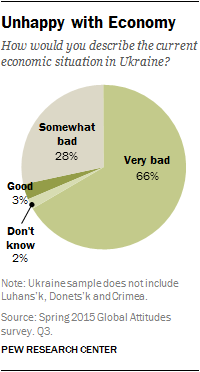 More than nine-in-ten Ukrainians think their country’s economic situation is bad (94%), including 66% who say it is very bad. Similar percentages gave the economy negative ratings in 2014.
More than nine-in-ten Ukrainians think their country’s economic situation is bad (94%), including 66% who say it is very bad. Similar percentages gave the economy negative ratings in 2014.
In addition to dissatisfaction with economic conditions, Ukrainians express little faith in some of their country’s major institutions. The public is especially critical of their court system. Just 11% say the judiciary is having a good influence on their nation. Roughly three-quarters (76%) say its influence is bad, including 45% who think it is very bad.
Only about a third (32%) thinks the government in Kyiv is having a good impact on the nation. Nearly six-in-ten (59%) say the central government is having a negative influence. Positive views of Kyiv have dropped 15 percentage points in the past 12 months.
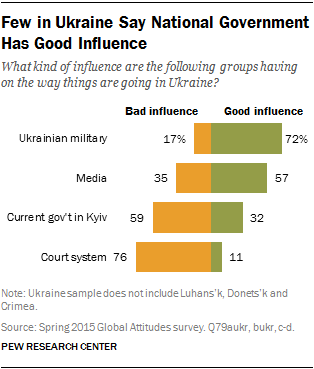 The country’s media fares much better, with a majority (57%) saying they have a good impact on the country. And Ukrainians rate the military most highly (72%). Eastern Ukrainians outside of the Donbas region are somewhat less happy with the military than those in the west. Nonetheless, majorities in both regions give the armed forces positive reviews (63% good influence in east vs. 79% in west).
The country’s media fares much better, with a majority (57%) saying they have a good impact on the country. And Ukrainians rate the military most highly (72%). Eastern Ukrainians outside of the Donbas region are somewhat less happy with the military than those in the west. Nonetheless, majorities in both regions give the armed forces positive reviews (63% good influence in east vs. 79% in west).
Ukrainians give both their president and prime minister negative marks. A plurality disapproves of President Petro Poroshenko’s job performance (43%), while just a third approves. A majority (60%) is unhappy with the way Prime Minister Arseniy Yatsenyuk is handling his job. Roughly half or more of eastern Ukrainians give Poroshenko (49%) and Yatsenyuk (66%) negative reviews. Western Ukrainians also give Yatsenyuk bad marks (55%) but are divided on Poroshenko (39% approve, 39% disapprove).
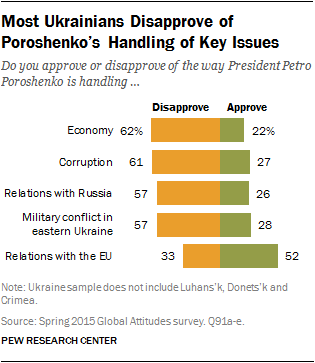 When it comes to specific policy areas, Ukrainians disapprove of Poroshenko’s handling of domestic and international affairs. Majorities say he is performing poorly on the issues of the economy (62% disapprove), corruption within the country (61%), relations with Russia (57%), and the conflict in eastern Ukraine (57%). On these issues the east and west agree – over half in both regions say Poroshenko is handling all these aspects of his job badly.
When it comes to specific policy areas, Ukrainians disapprove of Poroshenko’s handling of domestic and international affairs. Majorities say he is performing poorly on the issues of the economy (62% disapprove), corruption within the country (61%), relations with Russia (57%), and the conflict in eastern Ukraine (57%). On these issues the east and west agree – over half in both regions say Poroshenko is handling all these aspects of his job badly.
The one bright spot for Poroshenko is the European Union. About half of Ukrainians (52%) approve of his handling of relations with the Western organization, and just 33% disapprove.
Poroshenko has continued to pursue EU membership for Ukraine, as well as has attempted to convince EU nations to provide military aid. Ukrainians appear to approve of these efforts, though support on this issue is higher in the west (58%) than the east (46%).
The government in Kyiv also receives negative marks for its civil liberties record. A majority of Ukrainians (55%) believe their national government does not respect the personal freedoms of its people. Roughly a third (32%) thinks Kyiv protects its citizens’ rights.
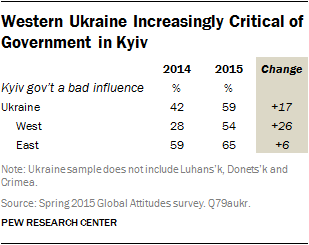 As was true in 2014, eastern Ukrainians are more negative about their national government than those in the west. However, western Ukrainians have become increasingly critical of Kyiv in the past 12 months. More than half (54%) in the west now say the national government is having a bad influence on the country. In 2014, only 28% of western Ukrainians gave Kyiv negative reviews and 60% were happy with its performance.
As was true in 2014, eastern Ukrainians are more negative about their national government than those in the west. However, western Ukrainians have become increasingly critical of Kyiv in the past 12 months. More than half (54%) in the west now say the national government is having a bad influence on the country. In 2014, only 28% of western Ukrainians gave Kyiv negative reviews and 60% were happy with its performance.
Ukrainians See Little Progress, Blame Russia for Conflict
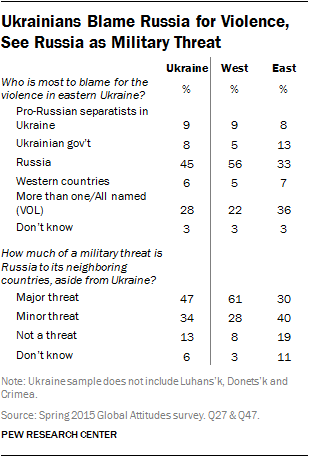 Few Ukrainians living outside of Donbas and Crimea think the military is making progress in its campaign against the separatists in the east (23%). Most say things are about the same as they have been (40%) or that the military is actually losing ground (21%). Eastern Ukrainians in the areas outside of Donbas are somewhat more likely than those in the west to say the military is losing to the rebels (25% in east vs. 18% in west). These impressions may be linked to the aftermath of the peace agreement that was signed in February of this year. It led to a fragile cease-fire that has been punctuated repeatedly by violent violations.
Few Ukrainians living outside of Donbas and Crimea think the military is making progress in its campaign against the separatists in the east (23%). Most say things are about the same as they have been (40%) or that the military is actually losing ground (21%). Eastern Ukrainians in the areas outside of Donbas are somewhat more likely than those in the west to say the military is losing to the rebels (25% in east vs. 18% in west). These impressions may be linked to the aftermath of the peace agreement that was signed in February of this year. It led to a fragile cease-fire that has been punctuated repeatedly by violent violations.
Overall, a plurality of Ukrainians say Russia is to blame for the violence in eastern Ukraine (45%). Few think either the separatists (9%), the Ukrainian government (8%) or Western countries (6%) are responsible, though many name more than one of these groups (28%). Western Ukrainians are much more likely to say Russia is the sole culprit (56%), while those in the east see the problem as more complicated. A third of Ukrainians in the east think Russia is primarily to blame, but 36% fault more than one of the groups.
Roughly half of Ukrainians (47%) believe Russia is a major military threat to other neighboring countries. Another 34% say the former Cold War power is a minor threat. Western Ukrainians are much more concerned about Russia’s territorial ambitions (61% major threat) than those in the east (30%).
Western Countries’ Aid Welcomed in Response to Crisis
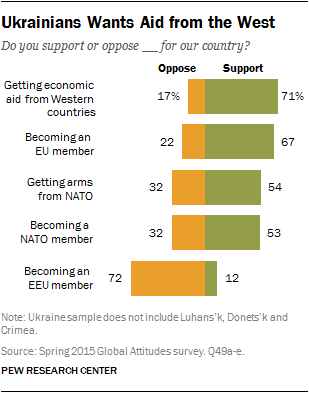 To help them in their time of crisis, more than half of Ukrainians outside of Luhans’k, Donets’k and Crimea want more help from Western countries, especially economic aid. Roughly seven-in-ten (71%) support receiving economic assistance from Western countries. In addition, two-thirds of Ukrainians want to join the EU. Ukrainians are more hesitant to either receive military arms from NATO (54% support) or join the alliance (53%).
To help them in their time of crisis, more than half of Ukrainians outside of Luhans’k, Donets’k and Crimea want more help from Western countries, especially economic aid. Roughly seven-in-ten (71%) support receiving economic assistance from Western countries. In addition, two-thirds of Ukrainians want to join the EU. Ukrainians are more hesitant to either receive military arms from NATO (54% support) or join the alliance (53%).
The topics of NATO and military aid are also more regionally divisive than either economic assistance or the EU. At least half in both the west and the east support receiving economic aid and joining the EU. When it comes to joining NATO, however, 68% in the country’s west support it, compared with just 34% of those in the east living outside of Donbas. Similarly, 66% in the west want NATO to send arms to the Ukrainian government, while just 38% of those in the east agree.
Regardless of their opinions about the EU or NATO, a broad majority of Ukrainians (72%) oppose joining the Eurasian Economic Union with Russia. This includes 82% of western Ukrainians and 61% of eastern Ukrainians living outside of Donbas. Similarly, nearly two-thirds of Ukrainians (65%) support increasing Western countries’ sanctions on Russia. Just 13% say they should stay at the same level as they are now, and only 12% say they should be decreased. Three-quarters of western Ukrainians support ratcheting up economic punishment of Russia, while 52% in the east agree.
Hope for a Peaceful End, but Little Support for Donbas Independence
Just as they did in 2014, most Ukrainians living outside of Donbas and Crimea think that in principle Ukraine should remain one, united country (85%), rather than allowing regions to secede (10%). Both western Ukrainians (91%) and those in the east (77%) continue to support unity.
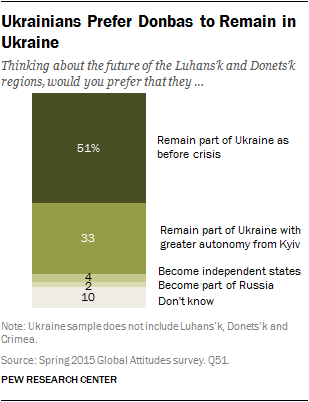 Similarly, a majority of Ukrainians prefer that Luhans’k and Donets’k remain part of Ukraine – either on the same terms with the national government as before the crisis (51%) or with greater regional autonomy (33%). Western Ukrainians are more supportive of the pre-crisis status quo (61%) than giving Donbas increased decision-making authority (27%). Eastern Ukrainians outside of Donbas are divided – 41% support greater autonomy while 37% prefer no change. Ukrainians living along the border of the conflict – the oblasts of Kharkiv, Dnipropetrovs’k and Zaporizhzhya – are more supportive (45%) than other easterners (36%) of granting increased authority to the Donbas region. Few Ukrainians in either the east or the west, however, want Luhans’k and Donets’k to become independent states or part of Russia.
Similarly, a majority of Ukrainians prefer that Luhans’k and Donets’k remain part of Ukraine – either on the same terms with the national government as before the crisis (51%) or with greater regional autonomy (33%). Western Ukrainians are more supportive of the pre-crisis status quo (61%) than giving Donbas increased decision-making authority (27%). Eastern Ukrainians outside of Donbas are divided – 41% support greater autonomy while 37% prefer no change. Ukrainians living along the border of the conflict – the oblasts of Kharkiv, Dnipropetrovs’k and Zaporizhzhya – are more supportive (45%) than other easterners (36%) of granting increased authority to the Donbas region. Few Ukrainians in either the east or the west, however, want Luhans’k and Donets’k to become independent states or part of Russia.
To end the crisis, a plurality of Ukrainians (47%) would prefer a negotiated settlement with the separatists and Russia. Roughly a quarter (23%) thinks the best approach is to use military force to fight the rebels. Ukrainians from the country’s west are more supportive of military action than those from the east (31% in west vs. 13% in east). Nonetheless, a plurality or more in each region say negotiations are best (40% in west vs. 56% in east). Ukrainians living in the border oblasts are the most supportive of negotiations to end the conflict (65%).
Ukraine Looks West
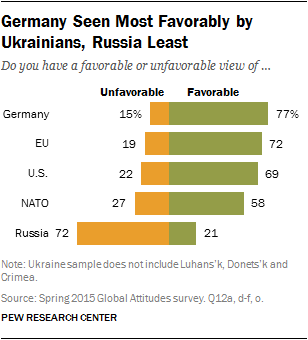 The crisis in eastern Ukraine continues to impact Ukrainians’ views of major world powers. Similar to 2014, Ukrainians outside of Donbas and Crimea have more positive opinions of Western nations than of Russia, though there are deep regional divides. Overall, majorities of Ukrainians have a favorable view of Germany, the EU, the U.S. and NATO. Nonetheless, Ukrainians in the west give Germany, the EU and the U.S. more positive ratings than do those in the east. The two regions are even more deeply divided over NATO (69% favorable in west vs. 43% in east). Russia, on the other hand, garners negative ratings from Ukrainians in both the west (81% unfavorable) and the east (61%).
The crisis in eastern Ukraine continues to impact Ukrainians’ views of major world powers. Similar to 2014, Ukrainians outside of Donbas and Crimea have more positive opinions of Western nations than of Russia, though there are deep regional divides. Overall, majorities of Ukrainians have a favorable view of Germany, the EU, the U.S. and NATO. Nonetheless, Ukrainians in the west give Germany, the EU and the U.S. more positive ratings than do those in the east. The two regions are even more deeply divided over NATO (69% favorable in west vs. 43% in east). Russia, on the other hand, garners negative ratings from Ukrainians in both the west (81% unfavorable) and the east (61%).
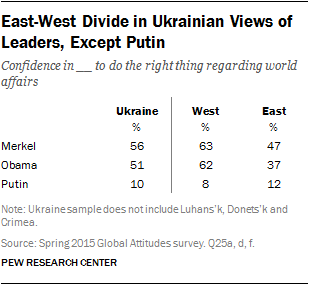 Roughly half or more of Ukrainians express confidence in German Chancellor Angela Merkel (56%) and U.S. President Barack Obama (51%) to do the right thing in world affairs. However, west and east Ukraine disagree over these two leaders. Majorities in the west express confidence in both Merkel and Obama, but less than half in the east outside of Donbas say the same about either. One person both western and eastern Ukrainians agree on is Russian President Vladimir Putin – 10% of Ukrainians express confidence in him and 84% do not.
Roughly half or more of Ukrainians express confidence in German Chancellor Angela Merkel (56%) and U.S. President Barack Obama (51%) to do the right thing in world affairs. However, west and east Ukraine disagree over these two leaders. Majorities in the west express confidence in both Merkel and Obama, but less than half in the east outside of Donbas say the same about either. One person both western and eastern Ukrainians agree on is Russian President Vladimir Putin – 10% of Ukrainians express confidence in him and 84% do not.
Similarly, a broad majority of Ukrainians (78%) believe the government of Russia does not respect the personal freedoms of its citizens. Just 12% says Moscow does protect civil liberties. There is less disagreement between eastern and western Ukrainians on this issue.
In addition, 47% of Ukrainians say the dissolution of the Soviet Union has been a good thing for their country. About a third (34%) says it has been a bad thing. On this aspect, eastern and western Ukrainians clearly disagree. A majority of those in the west say the end of the USSR was good for Ukraine (61%), while a plurality of those in the east say it was bad (45%).
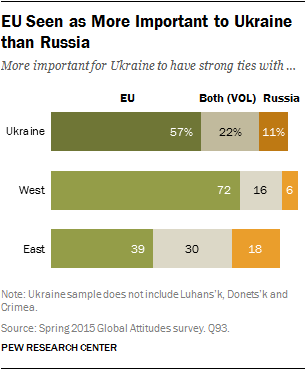 Despite some nostalgia for the Soviet Union, negative attitudes about Russia today dominate Ukrainians’ views of the future. Nearly six-in-ten (57%) say it is more important for Ukraine to have strong ties with the EU rather than with Russia (11%). About two-in-ten (22%) think both the EU and Russia are equally important to Ukraine. A broad majority of western Ukrainians (72%) choose the EU over Russia. A plurality of eastern Ukrainians living outside of Donbas (39%) make the same choice, though three-in-ten prefer strong ties with both. Just 18% of those in the east say strong ties with Russia are more important.
Despite some nostalgia for the Soviet Union, negative attitudes about Russia today dominate Ukrainians’ views of the future. Nearly six-in-ten (57%) say it is more important for Ukraine to have strong ties with the EU rather than with Russia (11%). About two-in-ten (22%) think both the EU and Russia are equally important to Ukraine. A broad majority of western Ukrainians (72%) choose the EU over Russia. A plurality of eastern Ukrainians living outside of Donbas (39%) make the same choice, though three-in-ten prefer strong ties with both. Just 18% of those in the east say strong ties with Russia are more important.
Young Ukrainians, those ages 18 to 29, are the most positive toward Western countries and organizations. Nearly eight-in-ten young people have a positive image of the EU (80% favorable) and the U.S. (79%), compared with less than seven-in-ten among those ages 50 and older (66% EU, 62% U.S.). Younger Ukrainians are also much more supportive of closer ties with the EU (67%) than their elders (51%). Meanwhile, despite equally negative views of Russia today among the young and old, Ukrainians ages 50 and older express much greater fondness for the Soviet Union (47% bad thing it dissolved) than younger Ukrainians (18%) who were born around the time of the fall of the Soviet Union, or a few years after.


